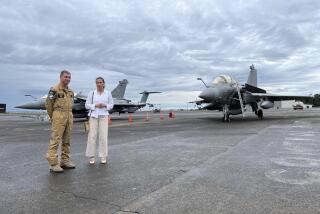U.S., Manila Reach Bases Agreement : Compensation for Clark, Subic Bay to Rise Sharply
- Share via
WASHINGTON — U.S. and Philippine negotiators agreed Saturday on terms for the continued operation of key U.S. military bases in the Philippines for the next two years and plan to sign an accord at the State Department on Monday, Administration officials said.
The accord, under negotiation since April, will provide $481 million in U.S. compensation in 1989 and 1990, up sharply from the current $180 million per year for the use of Clark Air Base and Subic Bay Naval Base. They are the largest U.S. military facilities overseas and among America’s most important.
The Philippines had been asking for $1.2 billion annually, but Washington had said consistently that such large sums could not be provided in an era of U.S. budget ceilings.
Help on Cutting Debt
In the end, Philippine negotiators said they would settle for a Reagan Administration statement that the next U.S. Administration will seek to help Manila reduce a $28-billion foreign debt by creative uses of the proceeds from an aid program that the United States, Japan and other countries are planning for the Philippines next year.
The wording of the U.S. statement on debt reduction was still under discussion among U.S. departments and agencies late Saturday. An informed official said it was expected, but not yet certain, that interagency agreement on that point would permit the ceremonial signing of a “memorandum of agreement” on the bases by Secretary of State George P. Shultz and Philippine Foreign Minister Raul Manglapus at the State Department on Monday.
As a concession to the Philippines, the Administration agreed to speed delivery of some U.S. aid that has been appropriated but not disbursed. Some of the aid will be made available in cash to facilitate quick spending, a U.S. official said.
Meetings in Washington
The breakthrough in the often contentious negotiations got a strong push in repeated unannounced meetings here this week between Manglapus and Assistant Secretary of State Gaston J. Sigur. In meetings of lower-level officials Saturday, Philippine negotiators said they were ready to sign the accord being discussed.
The negotiations are technically a review of the U.S.-Philippine bases agreement that expires in 1991. Successful completion of the review is necessary before more complex and difficult negotiations over the ultimate future of the bases can begin.
Large stockpiles of fuel and ammunition are maintained at Clark Air Base, from which the United States can stage airlift operations and train combat pilots based there. Subic Bay Naval Base is the main rest and repair stop for the U.S. fleet operating from the mid-Pacific to the Persian Gulf.
Because of the difficulty of reaching agreement on the bases review and doubts about renewal of the broader pact, the Pentagon for the first time seriously contemplated arrangements under which U.S. forces would be based elsewhere in the Pacific.
A speech last month by Soviet leader Mikhail S. Gorbachev offering to remove Soviet forces from bases in Vietnam if U.S. forces would leave the Philippines was a complicating factor in Philippine politics. But it does not appear to have seriously affected the negotiations between Washington and Manila.
Some Irritation Cited
Some congressional observers of the negotiations said they believed the Reagan Administration might have been more flexible had it not been for official irritation over statements by Manglapus raising doubts about the value of the U.S. facilities to the Philippines. U.S. officials believe that Philippine President Corazon Aquino made it clear at several key points that completion of the bases review was a priority.
The basic outline of the U.S. compensation package had been clear since it was placed on the negotiating table in Manila in midsummer, and the Reagan Administration rebuffed repeated efforts by the Philippines to increase the compensation level.
During the summer, the two sides resolved most of the other issues in the bases review, including the sensitive question of U.S. nuclear weapons.
The formula that emerged is said to be modeled on one developed between the United States and Spain, in which some limitations are placed on storage of nuclear weapons and perhaps on some airborne activity. However, the U.S. policy of neither confirming nor denying the presence of nuclear weapons, especially aboard U.S. warships, has not changed, according to U.S. officials.
More to Read
Sign up for Essential California
The most important California stories and recommendations in your inbox every morning.
You may occasionally receive promotional content from the Los Angeles Times.












